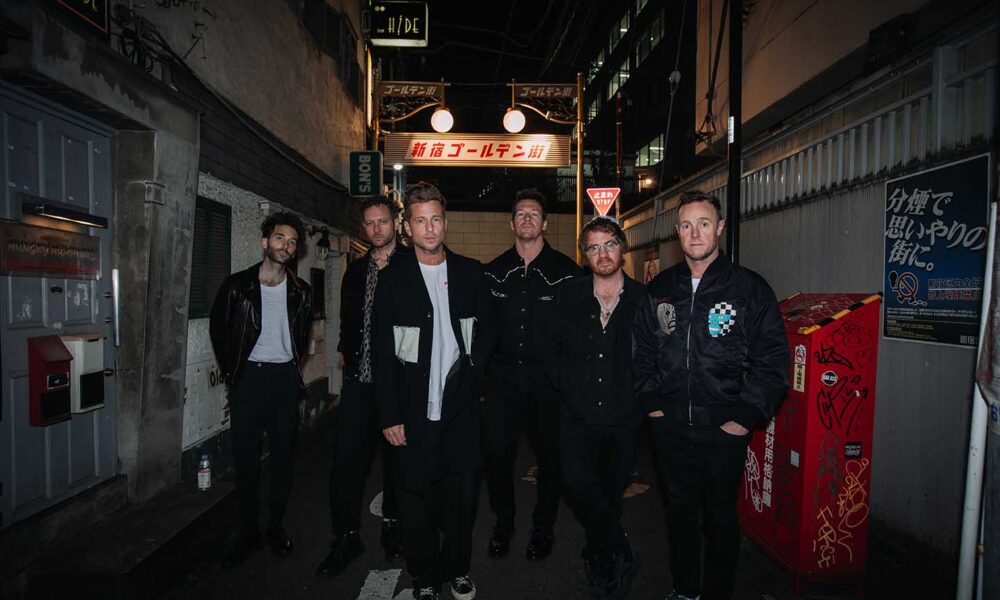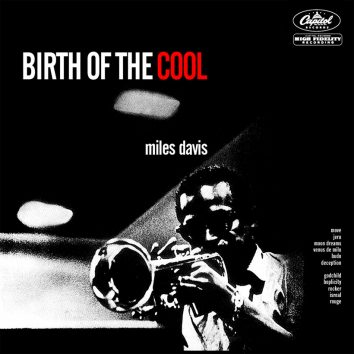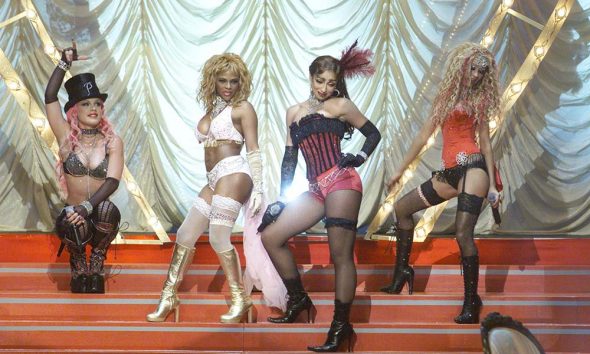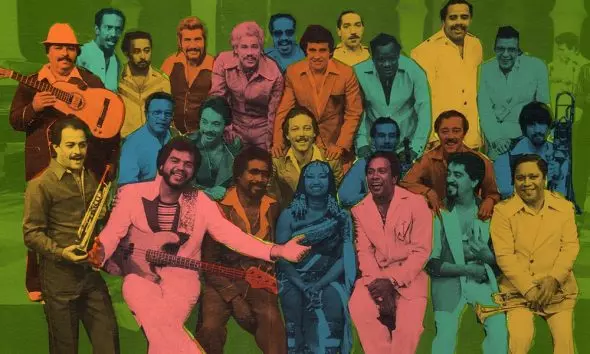Interview: OneRepublic’s Ryan Tedder On Writing Music For ‘Kaiju No. 8’
With a new song released today for the acclaimed series, the OneRepublic frontman discusses anime, songwriting, and more.

Is there a bigger pop group than OneRepublic at the moment? Since the release of their debut album Dreaming Out Loud in 2007, they have dominated charts around the world. Frontman Ryan Tedder has also worked as a producer, writing songs for artists such as Taylor Swift and Adele, and has won a number of awards including several Grammys.
In Japan, specifically, the band has become stars, especially among Western music fans, through events such as their first appearance at the rock festival Summer Sonic in 2008. Subsequently, they released “I Ain’t Worried,” which was featured in the 2022 blockbuster Top Gun: Maverick. The song reached the top 10 on the US chart, marking their fourth top 10 hit, and also made it into the top 3 on the foreign music chart in Japan. In 2023, their solo concert, held at the Tokyo Garden Theatre in Ariake, Tokyo, sold out quickly. Building on this momentum, the group recently ventured into new territory, releasing “Nobody (from Kaiju No. 8)” the closing theme for the anime Kaiju No. 8 in April 2024. The unusual situation, in which a Western group created a song for a Japanese anime, surprised not only their fans but also anime lovers.
Click to load video
The lyrics, which delicately capture the emotions of the characters, are in English, but link beautifully to the world of the anime. It’s attracted a wide range of listeners: As of this writing, it’s been streamed more than 100 million times. The music video, which also incorporates numerous elements of Japanese culture such as karaoke boxes, has also become a hit. Tedder, reflecting on the group’s popularity in Japan, had this to say: “It became very obvious that things were getting a lot bigger for us in Japan in the last two years. And I would have comments from different artists, like whether Maroon 5 or Charlie Puth or Tate McRae, like, ‘Wow, you guys are like huge in Japan. I hear your music everywhere.’ d4vd was like, jealous, very jealous because he’s like a massive anime fan. It’s fun when you hear from people, you know, 9,000 miles away or whatever, and they hear your music.”
Following the release of the song, the band performed at Summer Sonic 2024, and just six months later, they held a solo concert in January 2025. Both events drew packed audiences. These performances solidified their status as a major act in Japan, where Western music culture has traditionally struggled to gain popularity. Ryan believes that flexibly mixing their music and productions with various media and cultures has been hugely important. “The reason I focus on these cultural moments is because there are too many songs that come out every day. And even if you’re the best songwriter alive, I could write the best song of my life tomorrow, and when it comes out with 100… and we have 35 million followers on socials and all that other thing, I could go perform on The Voice or the TV shows. But it doesn’t work like it used to. It’s not the same. And so for an artist like us, these cultural events like a ‘Kaiju No. 8’ is everything.”
“Nobody (from Kaiju No. 8)” is a masterful blend not only of their keen sensibilities, but also of the atmosphere of the anime, and the heart-pounding excitement that listeners are looking for. “There is a method to writing for TV and film,” Tedder explains. “The primary method is, no matter what your inspiration is, no matter what the storyline is, if you are writing the theme to the show, then more or less, you are really writing the theme of the protagonist. It’s the protagonist’s show. No matter what you think you’re doing, if you want the song to succeed in the film, you are writing Tom Cruise’s song. His character. That’s what you’re writing.”
Click to load video
Even so, Tedder’s songs are never overly confined to the world of the work itself. Ryan’s rule in songwriting is to leave enough room for a wide range of interpretations. “There are so many things you have to do to have a song really be a hit, not just in a series, but outside of the series. If I’m too specific with the lyric, then the average listener cannot relate to it. It’s too… we call it like, “inside the screen.” Like if I get too far inside the screen and I’m in the movie with the lyric, it’s too much. ‘Nobody got you the way I do. Whatever demons you’re fighting through.’ That’s Kafka [from Kaiju No. 8]. But that’s also an average listener who’s never watched Kaiju No. 8. They can hear the song and go, ‘That’s me and my sister. That’s me and my mom. That’s me and my kid. That’s me and my best friend. That’s me and my lover.’ And that’s the perfect… when you get lucky enough, you have a song that checks all the boxes.”
The song was not only embraced by the anime’s passionate fans, but also led to further work on the series. OneRepublic also created the heart-pumping number “Invincible (from Kaiju No. 8)” as the ending theme song for “Kaiju No. 8 Season 1 Compilation / Hoshina’s Day Off,” released in March 2025. They’ve also provided the ending theme for Kaiju No. 8 Season 2, which will start in July. That song is called “Beautiful Colors.”
Listen to One Republic’s “Beautiful Colors” now.
“I mean, we were so excited. It’s smart for us, it’s smart for them because they know and I know that if it takes four or five songs to nail what they want, I will do four or five songs. And no other artist will do that. No one that I know, anyway. I just don’t know anyone that will do that. I’m so committed to writing for TV and film, and I know it takes a certain level of dedication to nail the perfect song. And that’s the level of commitment that we have to Kaiju. So I was very happy.”
As with the previous songs, he crafted the song with careful interpretation of the world of the anime. “I would say that when Kafka finally realizes what his powers are and what his responsibility is, I think that he sees… you know, I mean, he’s… he could be saying it to the other agents who are responsible. I mean, he’s a Kaiju, but he’s also now responsible for eliminating Kaiju. Kafka to me, if he’s looking in the mirror and he knows what he is inside, he knows what he’s hiding, he knows what he is. He is a Kaiju. So he’s saying, ‘But that’s kind of amazing, and it’s beautiful, and it is what it is, and I’m different than everybody else, but there’s a magic inside of me.’ And the magic is that he is a Kaiju.”
Tedder says that the song was also inspired by scenes and images of Japan that remain in his memories: “What I thought of when I was doing the lyric, I was thinking about like walking through various streets in Tokyo and Osaka and Kyoto, and you see this insane array of colorful signs. ‘All your beautiful colors,’ apply that to Tokyo, apply that to any major city in Japan, the countryside. It is a colorful, beautiful, a magical place from an American perspective. That’s Japan.”
Tedder also incorporated another message in the lyrics: diversity is what makes the world go round. “If I’m saying to somebody, ‘All your beautiful colors, you know, I see magic coming through inside of you,’ to anyone that feels rejected or small or less than or not beautiful or not unique enough, this lyric penetrates them. And those people, to me, are infinite. It’s everyone that you see walking through the street who’s slightly insecure. And when you really get to know people and you find all the layers that a person has and you’re like, ‘Wow, this person’s actually amazing, and I never would have known,’ right? So this is aimed at those people that feel not seen or less than seen.”
Through the song, he tells us that there is a unique beauty which can only be found by facing your inner self, rather than comparing yourself to others. “With the lyric ‘all the voices that tell you lies while you’re in the shadows building castles in the sky,’ I’m telling myself that I’m not good enough, I’m not smart enough, I’m not pretty enough, I’m not attractive enough. In my mind, ‘I’m building castles in the sky,’ which means I have big dreams and high hopes, a lot that I want to do, but I don’t think I can do it because I’m not good enough. And that’s what that opening lyric says. And that’s why, in the conversation between two people, the chorus comes in: ‘All your beautiful colors, I see them.’ Maybe you don’t see them, but I see them. And that’s what this song is about.”
Order OneRepublic: The Collection on vinyl now.
Interview by Naohisa Matsunaga










